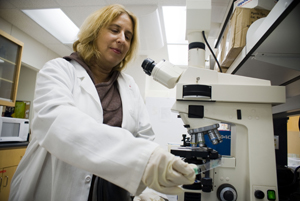 |
Nora Sarvetnick, Ph.D.. a world-renowned immunologist, believes a link exists between ultra clean environments and autoimmune diseases such as Type 1 diabetes. |
Nora Sarvetnick, Ph.D., UNMC professor and internationally renowned transplant immunologist, studies the relationship between the immune system and the environment.
She believes ultra clean environments make people more prone to autoimmune diseases, such as Type 1 diabetes.
“I always let my kids get in the dirt. I feel an increased exposure to environmental antigens is key,” Dr. Sarvetnick said. “Stimulus in the environment keeps the immune system fit, particularly in children.”
Environmental exposure may play role in diabetes
Her research has led her to theorize that a lack of exposure to environmental toxins might play a role in the worldwide increase of Type 1 diabetes.
Commonly referred to as juvenile diabetes — Type 1 is a disorder of the body’s immune system.
Immune system needs education
In order to fight off disease, Dr. Sarvetnick said the immune system has to be “educated,” or exposed to things in the environment such as insects and germs.
“What educates the immune system is interaction in the environment,” she said. “If you get sick, that’s how your immune system gets strong. It causes the immune system to mature and fight disease. If it doesn’t get enough information to mature, it will be weaker.”
Less Type 1 diabetes is developing nations
In countries where children are more exposed to their environment — particularly in developing nations — there is much less incidence of Type 1 diabetes, Dr. Sarvetnick said.
“One of the things we’re looking at is whether someone can get Type 1 diabetes if they’ve been raised in an environment that we consider too clean.”
She uses various mouse models to study what trips a response in the immune system to initiate diabetes and what is critical to developing the disease.
Research interests clinicians
Kevin Corley, M.D., medical director of the pediatric endocrinology program at UNMC and Children’s Hospital & Medical Center, is alarmed by the increase in Type 1 diabetes in children. In the last two years, he’s diagnosed more than 160 cases — nearly double of what he saw 10 years ago.
Dr. Sarvetnick’s research intrigues him.
“We don’t understand the basis for (Type 1 diabetes),” Dr. Corley said. “If we can find answers in the environment, that would be wonderful.”